 |
 BERYL FRASER BRIAN LLOYD NIEL ROSS RAY DAFTER |
|||
|
Name: Brian Lloyd
Age: 74 Occupation during 1939: Child living with his brother and parents at Ten Mile on the Goulburn River. Age at time of fire: 9 Location of interview: Melbourne "We saw a fire come up from the north heading south like giant red kangaroos leaping through the tops of the trees, a terrible sight, a frightening sight and obviously we had to get down to the river pretty quick to take shelter." On January 13th 1939 I lived at Ten Mile, which is 10 miles south of Jamieson on the Goulburn River, and in the morning we started to feel a little bit edgy about the fire reports on the radio. We’d just got a radio at that time and we had a phone call from Melbourne from some of our relatives expressing concern about us because they’d been hearing stories on the radio about fires around Healesville and around our way. We sort of went, “We’re okay”. My mother said that, and then I suppose about midday or late morning, the smoke started to appear - and then the wind. The wind was fierce, a fierce north gusty wind and the next thing, across the river from our place, we saw a fire come up from the north heading south like giant red kangaroos leaping through the tops of the trees, a terrible sight, a frightening sight and obviously we had to get down to the river pretty quick to take shelter. I was nine years old, my brother was seven. "There were tins of kerosene and ancient ammunition exploding and the tins of kerosene going off were like the flash of a bomb going off; and the whole place just burnt." My father thought he’d hang around the house for a while just in case there were a few fires, and there were. He had sparks flying everywhere, the dry grass started to catch fire and then the fences leading up to our house - and actually joining on to our house - caught on fire. My father thought he’d better go in and get what ever he could out of the place - the second time he went in he was lucky to get out. He was nearly overcome by fumes. The house went up like a bomb as they did in the recent fires in Canberra. Once an old weather board house catches fire that’s the end of it, so he scrambled some stuff into a couple of suit cases, which later turned out to be not worth saving, and he came down to the river to us and we watched the whole place go up. From our shelter in the river - we were actually in the river, it was pretty shallow, but we were actually in the river - we could see the old Ten Mile Hotel go up in flames. There were tins of kerosene and ancient ammunition exploding and the tins of kerosene going off were like the flash of a bomb going off; and the whole place just burned. We would have been in the river about two or three hours I suppose. The first flash of fire went through the place fairly quickly but it was followed by a lot of secondary fires coming from everywhere set off by the remains of burning buildings and sparks and embers. The safest place to be was in the river. I remember there was a middle-aged Italian lady in the river near us, just moved into the place, fresh out from Italy, and she was wailing and going on. She didn’t know what to make of Australia. It was a frightening day. When it was all over, a quiet descended. I can’t remember much about that, but towards the late afternoon, a friend of ours named Clary Anderson, came up from the hotel at Kevington just down the road a bit, in his car - he was one of the only people who had a car - and he took us down to the Kevington Hotel where we spent the night. "I think some of the fellows walking along the road were sort of half blinded. And that was pretty tough for a nine-year-old kid to see." Well, I suppose looking back on it, I was seeing the whole of my life go up in flames, because it was a pretty isolated place. We had school every second day, very few play-mates, so the place was our life and it all went up in flames. The next day when we came back and had a look at the ashes of our home, there were remains of toys and stuff but we didn’t actually take anything away because it was all gone. Later on we found my money box with melted coins in it. The only thing standing was a few chimneys. I didn’t cry or anything, it was just a feeling of numbness after that. My parents were pretty devastated, they lost everything. I think they had 50 pounds in the bank and that was it, you know, everything went up. The house we had been living in was her mother's place originally, so it had all my grandparents' wedding presents and stuff and all my parents’ belongings - photographs, kitchen-ware, wedding presents, books – everything gone. So they were faced with starting life afresh and I don’t think that dawned on them on the first day, but the realisation would have dawned on them later on. We spent the night at the Kevington Hotel, which is a little place beside the road at Kevington, just three mile down the road towards Jamieson and then the next day we were driven down to Thornton, below Lake Eildon. And I remember as we approached Thornton, we saw people walking along the road. They were just devastated, stunned. The Rubicon Valley, which comes down to Thornton was burned, which was a timber getting place and it was burned badly and there were a lot of people badly affected by smoke. I think some of the fellows walking along the road were sort of half blinded. And that was pretty tough for a nine-year-old kid to see. "But that’s the way we were, we were totally dependant on people’s charity, and many people were in our situation of course." One of the marvellous things that I remember very soon afterwards, was the way the state relief committee got into action. They brought clothes and stuff and my mother was able to go in - I think it was in the School or in the hall at Thornton - and we were able to pick over what was there. I remember I got my first long pants suit, somebody had donated it and it was a beautiful little suit and I took great pride in wearing it. But that’s the way we were, we were totally dependant on people’s charity, and many people were in our situation of course. All we had were the clothes we were wearing. My mother had to go to Melbourne and do a bit of shopping at one stage, and I don’t know where she got the money because they had very little money. I remember one act of kindness that I recall with great affection. The lady at the Thornton pub had one of the few cars in the town, and ‘Snow White and the Seven Dwarfs’ was showing at Alexandra so she took my mother and my brother and me into Alexandra to see ‘Snow White and the Seven Dwarfs’. She understood that we were doing it tough. " I suppose what happened was the Australian spirit came to the fore and they just had to start again." We lived at Thornton for six months or so with my mother’s brother-in-law and her mother. My father was out of work. He had been a mine manager and of course, the mines were gone and there was no mining. He made a precarious living helping farmers dynamite tree stumps on their property and things like that, then he got a job with the State Rivers and Water Supply Commission towards the end of 1939 at Forest in the Otway Ranges and so we moved down there. I think we’d arrived just before war broke out in 1939. We were living in a little two-room galvanised iron hut with a tent attached and room for us boys and it was our home for the next couple of years. I suppose what happened was the Australian spirit came to the fore and they just had to start again. Read more about the 1939 Black Friday bushfires in Ten Mile in the Newspaper Section |
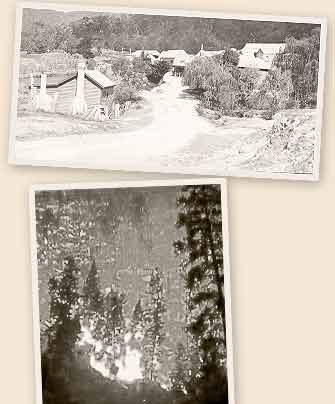 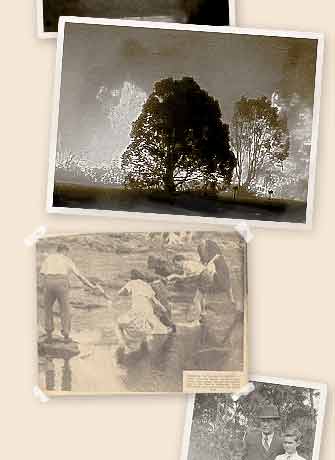 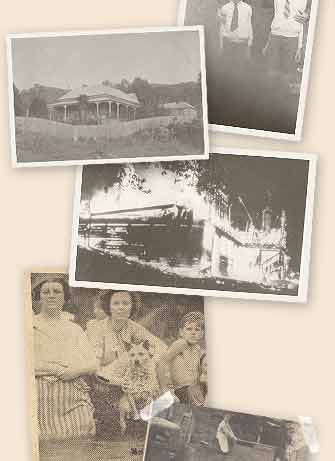 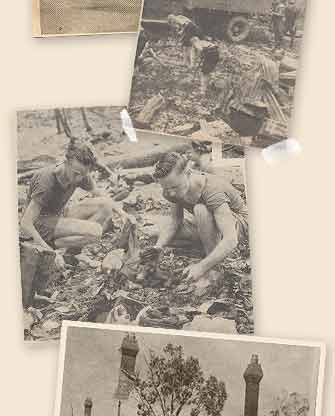 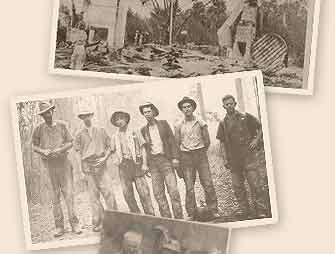 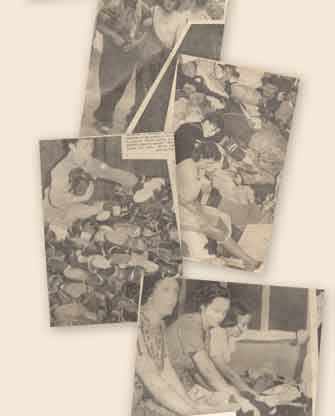 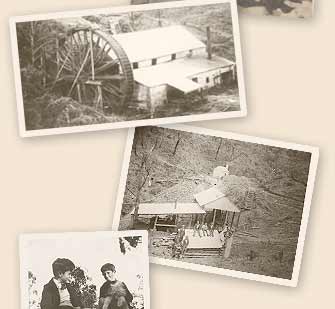 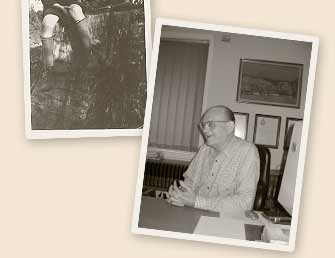
|
||
 |